At land's end, a field of stars
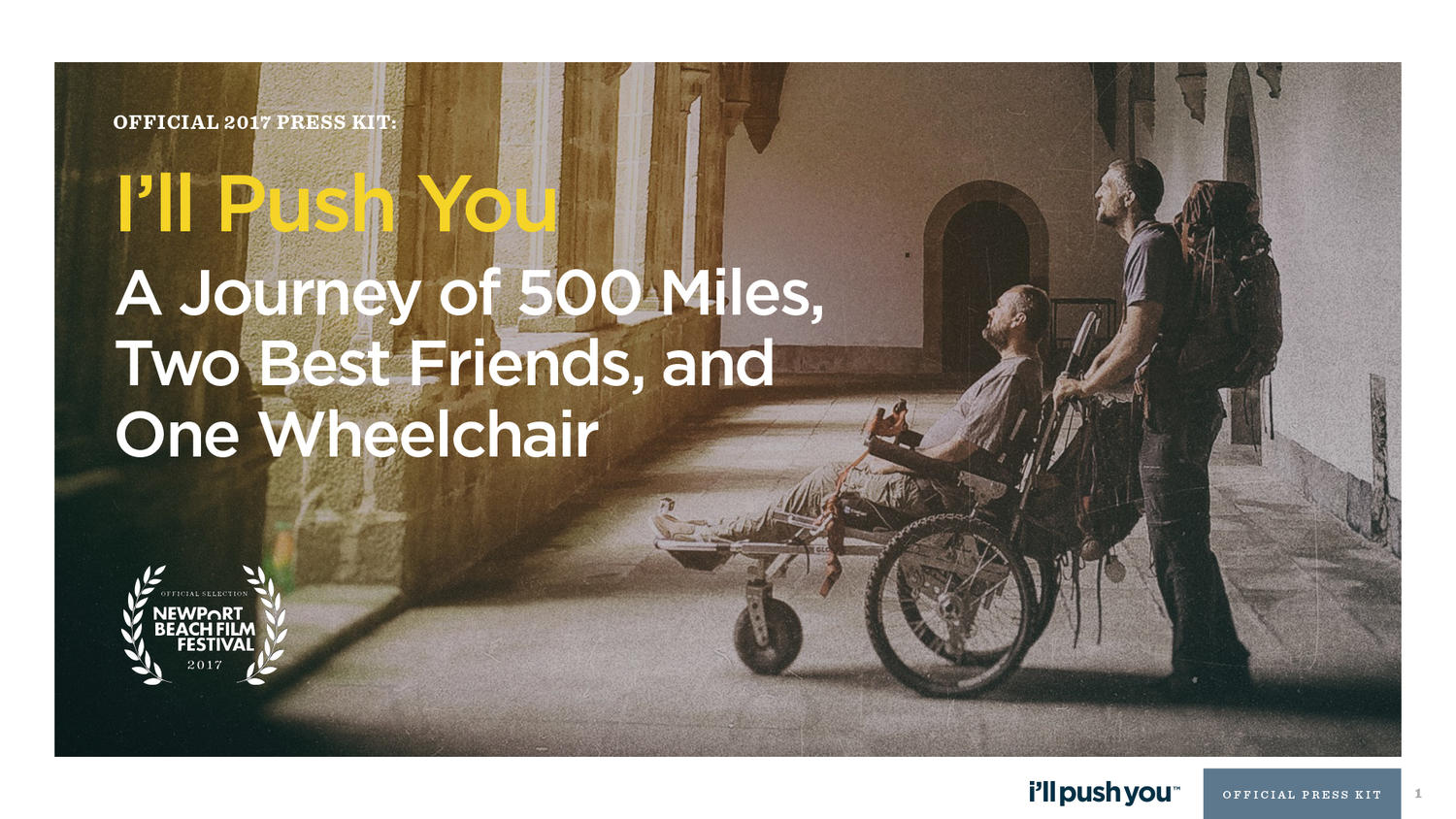 There's a new movie out, called "I'll Push You." It's an inspiring story of two friends who travel the legendary pilgrimage route in the north of Spain, the Camino de Santiago de Compostela. I won't be seeing it.
There's a new movie out, called "I'll Push You." It's an inspiring story of two friends who travel the legendary pilgrimage route in the north of Spain, the Camino de Santiago de Compostela. I won't be seeing it.
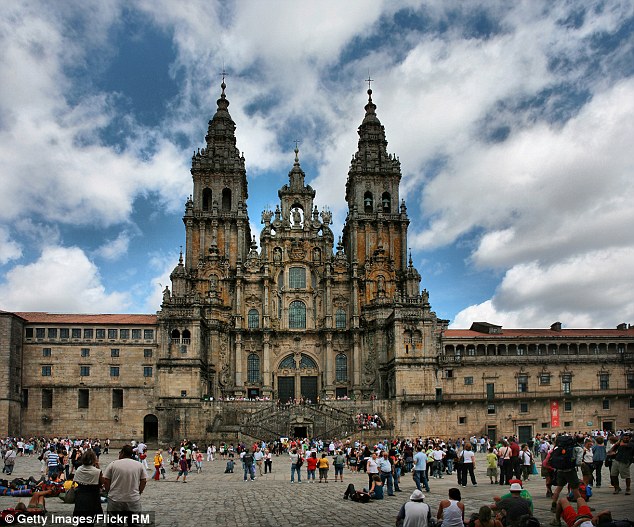 Santiago de Compostela Cathedral, Getty ImagesAs my 60th birthday loomed in the distance, I entertained crazy dreams of doing the Camino. I watched "The Way," a beautiful movie about lost souls drawn to the rough countryside, walking all day for at least a month to arrive at the cathedral of St. James, where the apostle is supposedly buried. I've made pilgrimages to the tomb of St. Peter in Rome, the Holy Shroud in Turin, and the cathedral at Canterbury; I've done a bike century and the Avon Three-Day walk for breast cancer. The Camino beckoned as the ultimate journey, mostly in bold defiance of getting older. Just put one foot in front of the other. Wear a scallop shell—the pilgrim's ancient badge—and stay in hostels. Eat tapas, pray, love.
Santiago de Compostela Cathedral, Getty ImagesAs my 60th birthday loomed in the distance, I entertained crazy dreams of doing the Camino. I watched "The Way," a beautiful movie about lost souls drawn to the rough countryside, walking all day for at least a month to arrive at the cathedral of St. James, where the apostle is supposedly buried. I've made pilgrimages to the tomb of St. Peter in Rome, the Holy Shroud in Turin, and the cathedral at Canterbury; I've done a bike century and the Avon Three-Day walk for breast cancer. The Camino beckoned as the ultimate journey, mostly in bold defiance of getting older. Just put one foot in front of the other. Wear a scallop shell—the pilgrim's ancient badge—and stay in hostels. Eat tapas, pray, love.
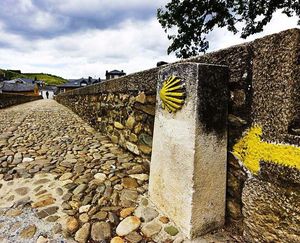 Photo: Turismo AsturiasBut I didn't get in shape and save up money and go walk the Camino. I didn't really do anything special. Had a nice birthday dinner with my family in Brooklyn. No epic walk, no epiphanies in a distant land on ancient stones.
Photo: Turismo AsturiasBut I didn't get in shape and save up money and go walk the Camino. I didn't really do anything special. Had a nice birthday dinner with my family in Brooklyn. No epic walk, no epiphanies in a distant land on ancient stones.
But someone else walked a Camino of their own, and it was my privilege to walk some of the way alongside them.
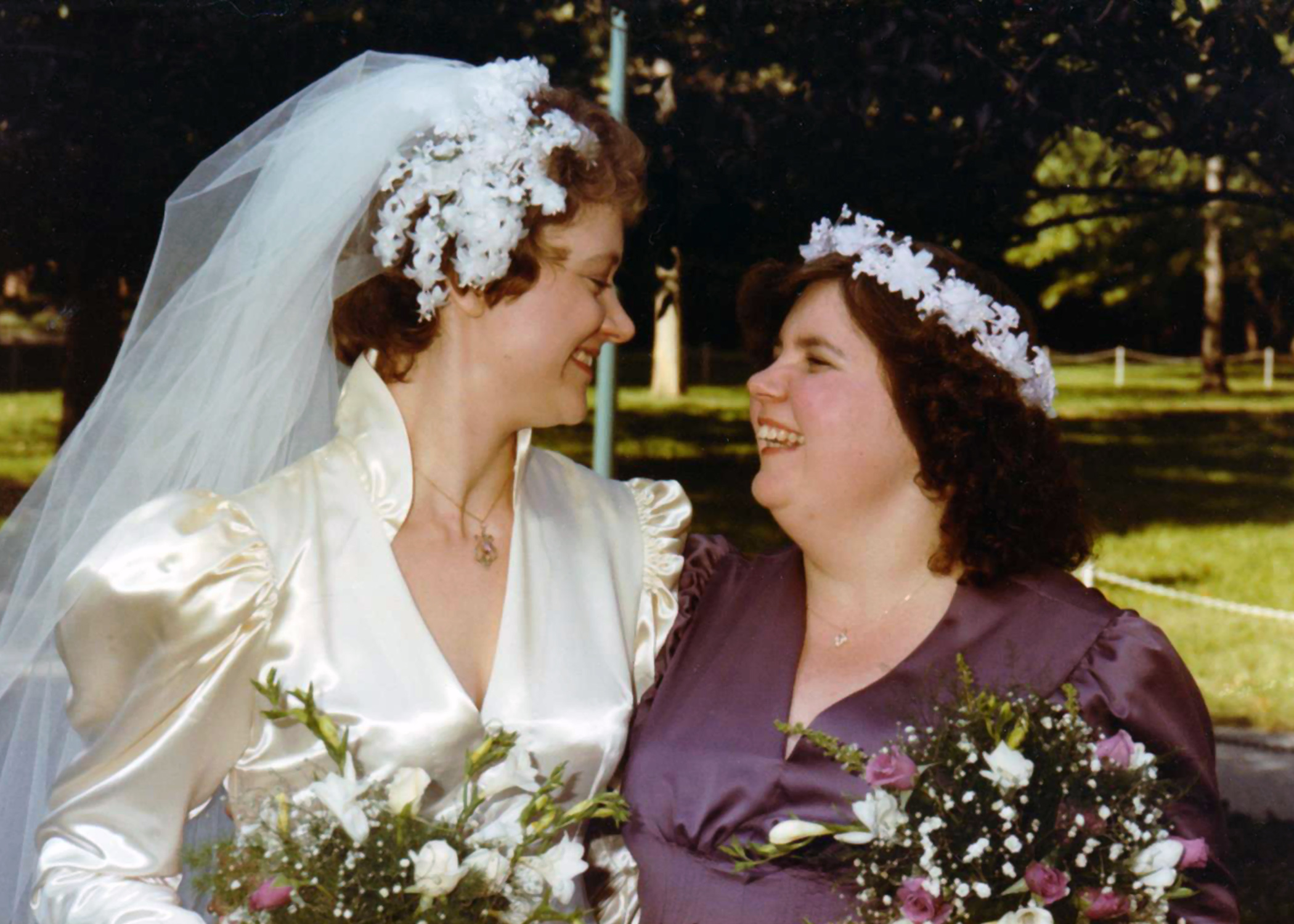 My BFF, as the kids say in their texting. My Best Friend Forever. We met in freshman year of high school. She thought I was a prig. I thought she was a brat. We were both right. I loosened up, under her transgressive tutelage. She reined it in, under my watchful eye. We grew up.
My BFF, as the kids say in their texting. My Best Friend Forever. We met in freshman year of high school. She thought I was a prig. I thought she was a brat. We were both right. I loosened up, under her transgressive tutelage. She reined it in, under my watchful eye. We grew up.
We got married, maid and matron of honor for one another.
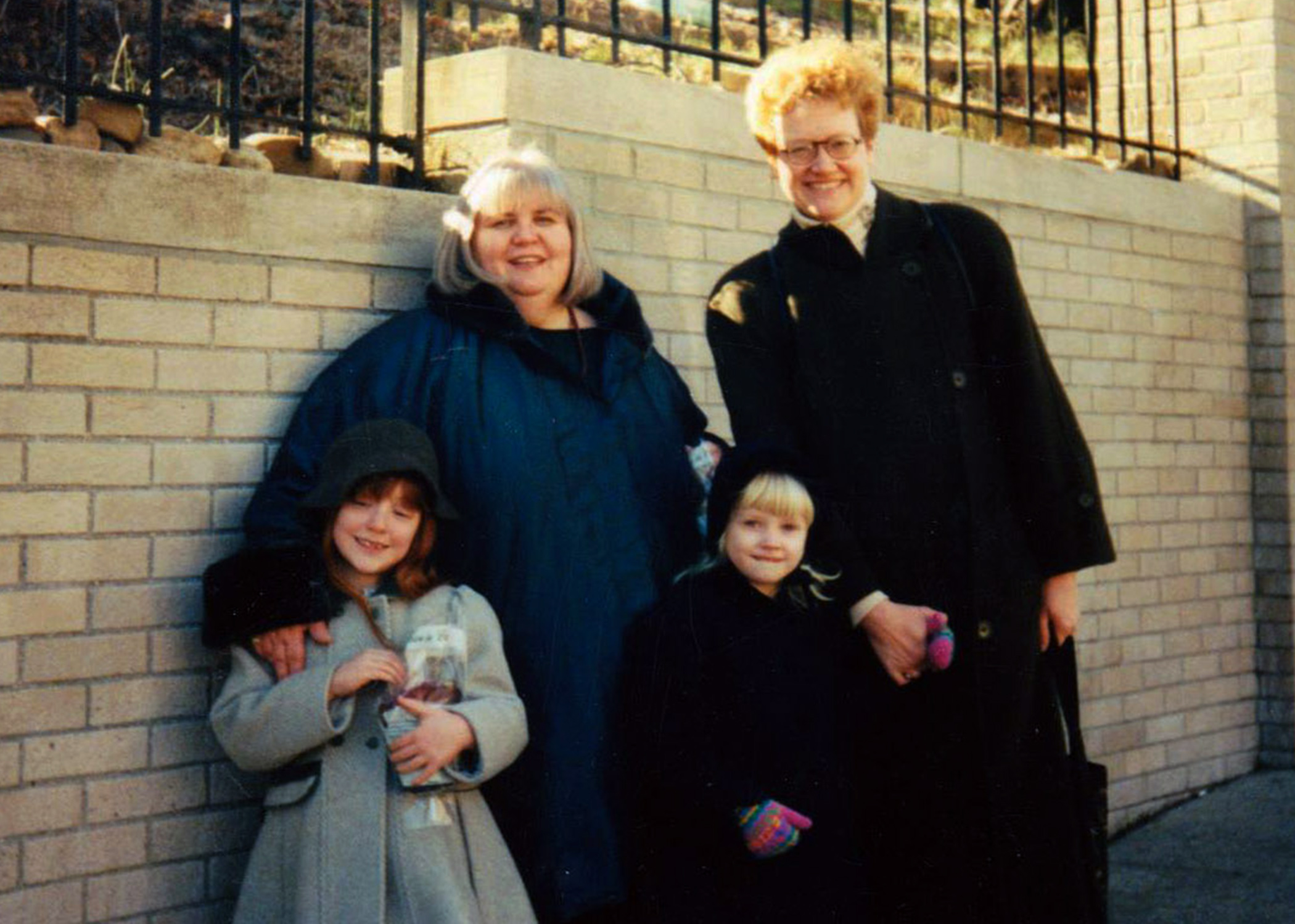 We had daughters, godmothers each to the other's.
We had daughters, godmothers each to the other's.
We spoke just about every day for 45 years, our shared lives a room furnished with instant access to a thousand memories, created once we both entered it. Like the Holodeck on "Star Trek: The Next Generation," we could conjure up and frolic in any scene with a private shorthand.
Most of all, we ate together, and laughed together, and loved each other. A terrible thing, apparently, that laughter-for-two: It almost got us kicked out of places. Except comedy clubs, they loved us there. At chemo, the nurses said they looked forward to our coming, because the laughing would start.
And I guess chemo was our Camino. Hers, mostly, but I went along for the ride. Because we always got together once a week, so why not hang out together?
No tapas, though, just soup at Panera and, when she was too weak for that, the hospital panini we came to revile (and a snack pack of nuts from the cafeteria that we raucously dubbed our Nut Sack).
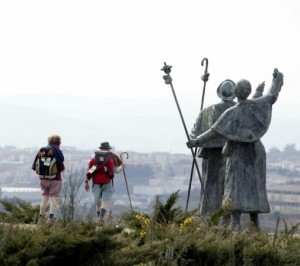 No ancient cathedral with swinging censer, but the beautiful little chapel on the hospital grounds. Then not even that; they moved chemo to an "infusion center" in a bland office park on Northern Boulevard in Glen Cove. Our Camino was now a stretch of mini-malls and parking lots, waiting rooms and treatment bays.
No ancient cathedral with swinging censer, but the beautiful little chapel on the hospital grounds. Then not even that; they moved chemo to an "infusion center" in a bland office park on Northern Boulevard in Glen Cove. Our Camino was now a stretch of mini-malls and parking lots, waiting rooms and treatment bays.
No pilgrim staff, but an endless succession of IV poles, monitors, tubes and needles.
No scallop-shell badge, but a port under her delicate skin below the clavicle. Four ports, actually; they kept getting infected, and once the surgeon screwed up and it moved.
No "Compostela," the age-old Latin certificate for completing the Camino, but a cupcake and card and jubilation from the nurses when she finished the first five months of weekly treatments. When cancer returned less than a year later, and chemo started again, there would be no finishing the regimen. Chemo was the new normal, and all its attendant miseries.
No rustic Spanish inns (those along the Camino helped originate the concept of "hospital"). But one whole summer in a hospital bed as cancer struggled, and failed, to take her away from us a year ago.
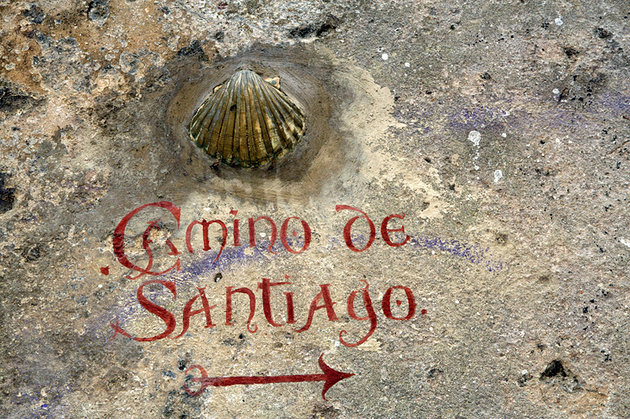 After that, there were days she needed a wheelchair. Last summer, pushing 60, I was crushed to discover that I could no longer push hers, at least not uphill. (And that's why I won't be seeing that inspiring movie.)
After that, there were days she needed a wheelchair. Last summer, pushing 60, I was crushed to discover that I could no longer push hers, at least not uphill. (And that's why I won't be seeing that inspiring movie.)
But every road ends. Two weeks ago, my friend reached the end of hers. It took three years. She walked the last bit without me, but her greatest champion, her beloved husband, walked her right to the end.
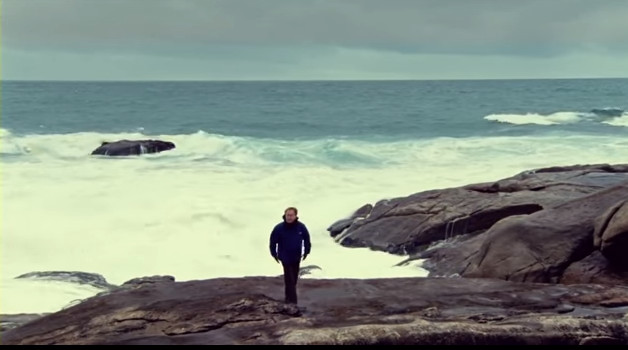 From "The Way," 2010Beyond the town and the cathedral of Saint James, many pilgrims walk further, to the westernmost coast of Spain, to a place called Finisterre—literally, Land's End. Overhead, the Milky Way is said to seem close, as if pointing out over the Atlantic. Compostela, in fact, means "field of stars." There, many pilgrims leave a souvenir of their travels, or burn the shoes they walked there in.
From "The Way," 2010Beyond the town and the cathedral of Saint James, many pilgrims walk further, to the westernmost coast of Spain, to a place called Finisterre—literally, Land's End. Overhead, the Milky Way is said to seem close, as if pointing out over the Atlantic. Compostela, in fact, means "field of stars." There, many pilgrims leave a souvenir of their travels, or burn the shoes they walked there in.
My friend has gone beyond Land's End. I know what she leaves behind, what we'd both burn: a bonfire of walkers, wheelchairs, tubing, pills, gauze and needles. But she also leaves us behind, we who revolved around her like planets around a sun. What's left at Land's End is a field of stars overhead. A glorious thing, but it's no daily, delicious phone call.
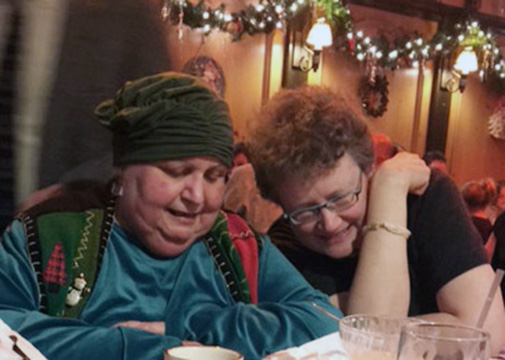 So, you look back and you see the road you walked, and it's where you meant to go all along. As if sent to me by Providence, I just found a poet who says in a TED talk that this place, Finisterre, is where the conversation happens. The conversation is precisely what is missing from me now, missing like an arm or a leg. So I'll keep talking. And listening for the stars to laugh.
So, you look back and you see the road you walked, and it's where you meant to go all along. As if sent to me by Providence, I just found a poet who says in a TED talk that this place, Finisterre, is where the conversation happens. The conversation is precisely what is missing from me now, missing like an arm or a leg. So I'll keep talking. And listening for the stars to laugh.
Invincible centurion
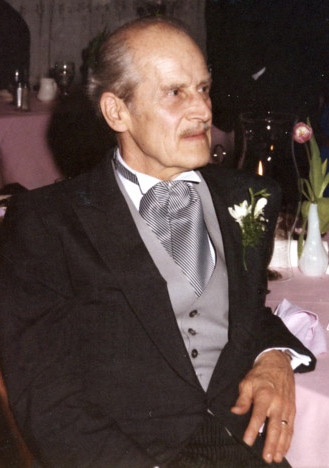 I know the word for "hundred-year-old person" is "centenarian," not centurion. But so my dad seems to me: a leader and a special kind of warrior, a fighter against darkness, sadness, and despair. He would have been 100 years old today, but he died of leukemia at 69, just two years into our marriage. Yet for the next three decades, he has exemplified what Camus declared: "In the depths of winter, I finally learned that within me there lay an invincible summer."
I know the word for "hundred-year-old person" is "centenarian," not centurion. But so my dad seems to me: a leader and a special kind of warrior, a fighter against darkness, sadness, and despair. He would have been 100 years old today, but he died of leukemia at 69, just two years into our marriage. Yet for the next three decades, he has exemplified what Camus declared: "In the depths of winter, I finally learned that within me there lay an invincible summer."
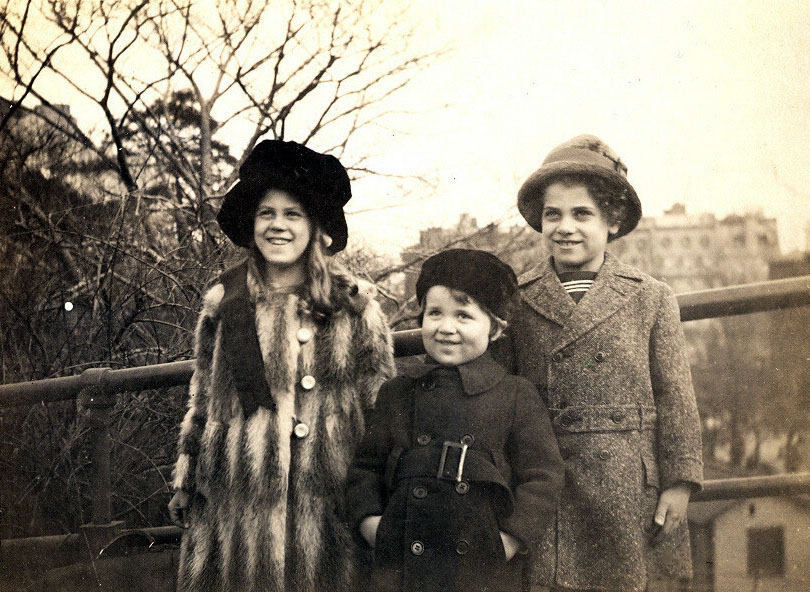 Daddy, center, with twin older siblings Vivian (Don) and ValeskaI have written often of my dad, a briliant handyman and sort of patron saint of the Crazy Stable, which he never saw. He was born to a pianist and an artist on Manhattan's Upper West Side on this day in 1917. A plump and mischievous little boy grew into a handsome and somewhat aimless young man, a championship swimmer who shrugged off college and drifted among jobs in various fields, including resorts and retail.
Daddy, center, with twin older siblings Vivian (Don) and ValeskaI have written often of my dad, a briliant handyman and sort of patron saint of the Crazy Stable, which he never saw. He was born to a pianist and an artist on Manhattan's Upper West Side on this day in 1917. A plump and mischievous little boy grew into a handsome and somewhat aimless young man, a championship swimmer who shrugged off college and drifted among jobs in various fields, including resorts and retail.
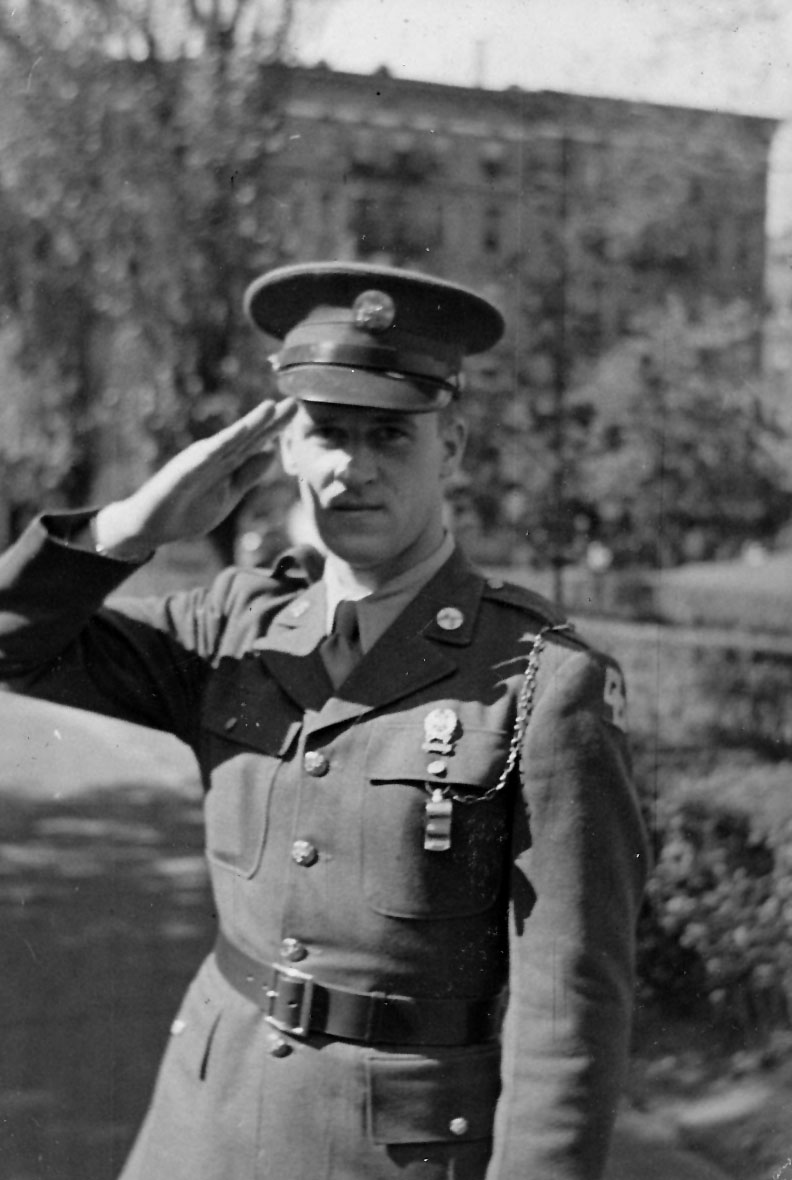 Private Becker, 240th MP BattalionLike so many other young men of his "Greatest Generation," World War II gave his life sudden purpose. As an Army MP, he made sharpshooter, and conscientiously guarded his president, FDR, at Hyde Park, then served in Reconstruction Japan. There, stationed approximately midway between Hiroshima and Nagasaki, could he have been exposed to radiation that would shorten his life by decades compared to his father and siblings, who all lived to be nearly 100? We'll never know. He brought home a kimono and a handful of Japanese coins, which I have to this day, and a GI phrasebook he memorized for life. He taught me to say arigato and to stand at attention and "at ease," and to properly fold an American flag.
Private Becker, 240th MP BattalionLike so many other young men of his "Greatest Generation," World War II gave his life sudden purpose. As an Army MP, he made sharpshooter, and conscientiously guarded his president, FDR, at Hyde Park, then served in Reconstruction Japan. There, stationed approximately midway between Hiroshima and Nagasaki, could he have been exposed to radiation that would shorten his life by decades compared to his father and siblings, who all lived to be nearly 100? We'll never know. He brought home a kimono and a handful of Japanese coins, which I have to this day, and a GI phrasebook he memorized for life. He taught me to say arigato and to stand at attention and "at ease," and to properly fold an American flag.
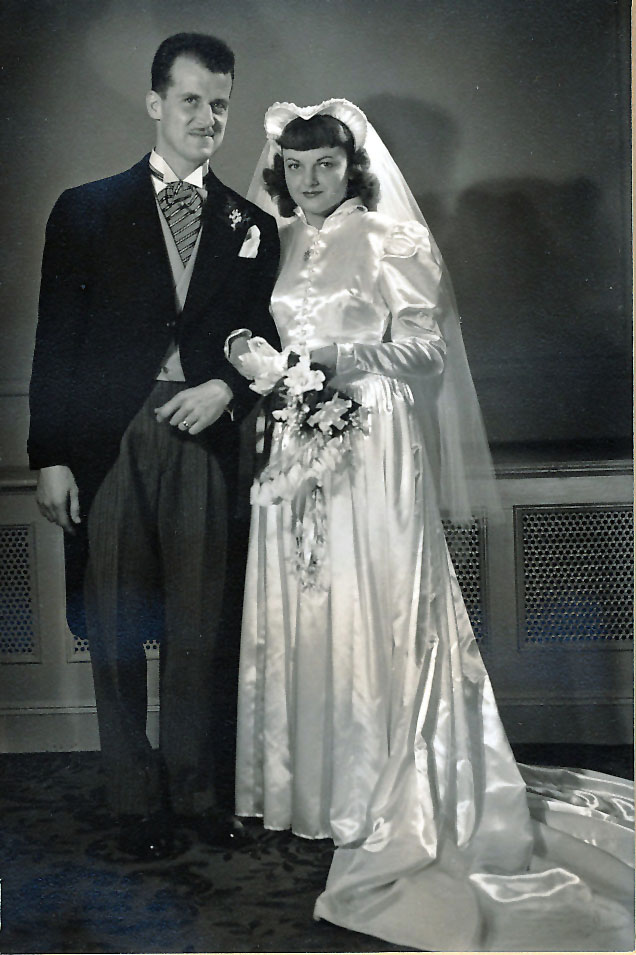 After the war, he got a business degree on the GI Bill, and married the love of his live after an epic 15-year courtship. His sunny nature and chivalry carried my mother above the dark, tormented undercurrents of her nature and her past. Through her (and Fulton Sheen), he came to the Catholic Church as an adult convert, his personality drawn to and reflected in Christ's. Quentin Roland Becker was baptised in St. Paul's Church in Manhattan and became Richard Quentin Becker; old friends and my mother called him "Quen," while business associates called him "Dick." He settled down in the insurance industry, became a dad.
After the war, he got a business degree on the GI Bill, and married the love of his live after an epic 15-year courtship. His sunny nature and chivalry carried my mother above the dark, tormented undercurrents of her nature and her past. Through her (and Fulton Sheen), he came to the Catholic Church as an adult convert, his personality drawn to and reflected in Christ's. Quentin Roland Becker was baptised in St. Paul's Church in Manhattan and became Richard Quentin Becker; old friends and my mother called him "Quen," while business associates called him "Dick." He settled down in the insurance industry, became a dad.
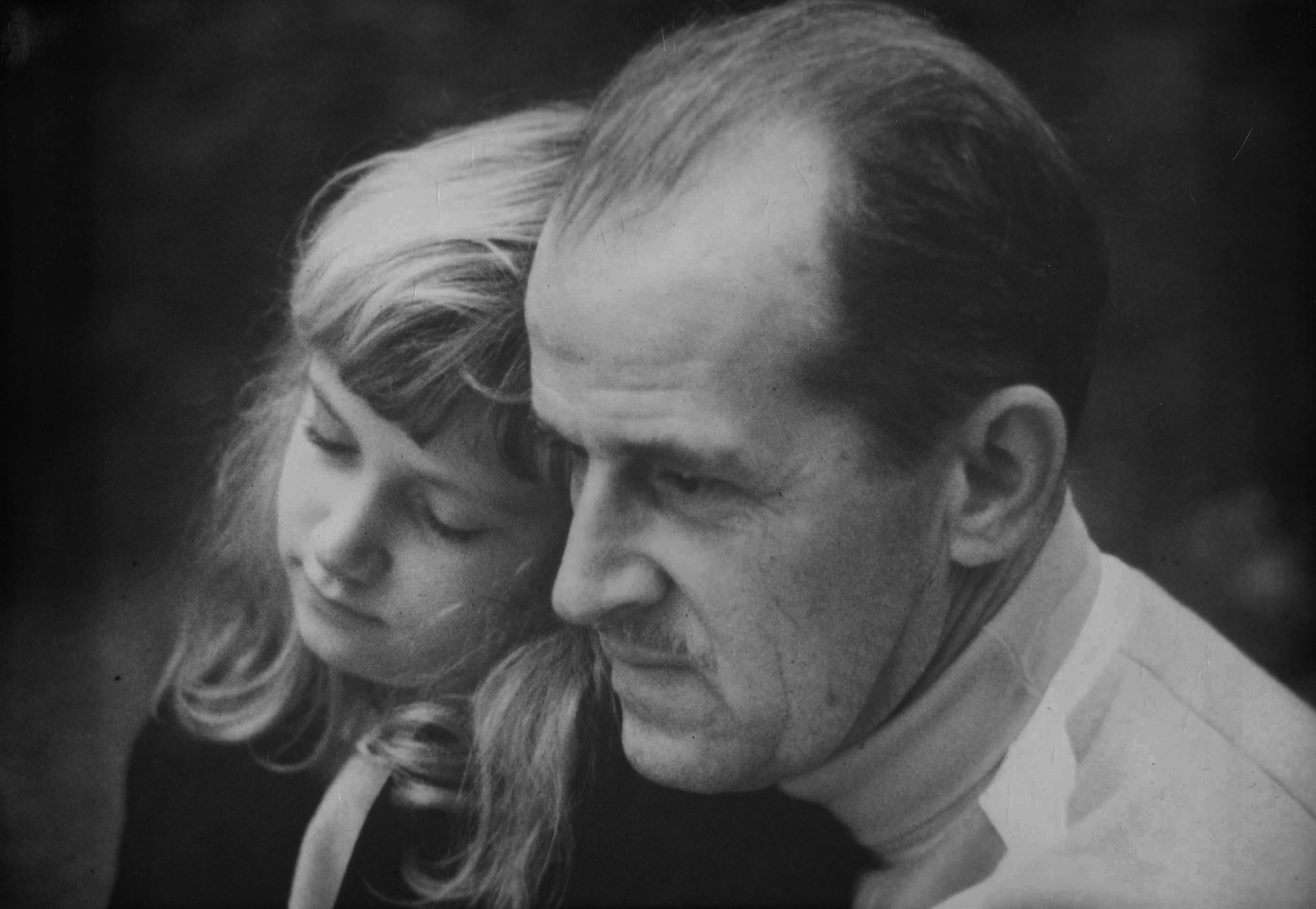 And as a dad, he shared with me so many things he loved: Gardening. Classical music. Science. Nature walks. But most of all, he taught me how to be happy. Or rather, how to choose to be happy--by turning outward, helping others, laughing gently at oneself. By "lighting a candle instead of cursing the darkness."
And as a dad, he shared with me so many things he loved: Gardening. Classical music. Science. Nature walks. But most of all, he taught me how to be happy. Or rather, how to choose to be happy--by turning outward, helping others, laughing gently at oneself. By "lighting a candle instead of cursing the darkness."
I wonder what he would be like at 100. No, actually, I don't. However diminished in body or mind, he would be invincible summer. Today, on his hundredth birthday, my garden--having bloomed in glorious warmth--was socked with heavy, wet snow. Every tender bloom that had opened has prevailed, and now the sun is out again. These photos are my gift to him.
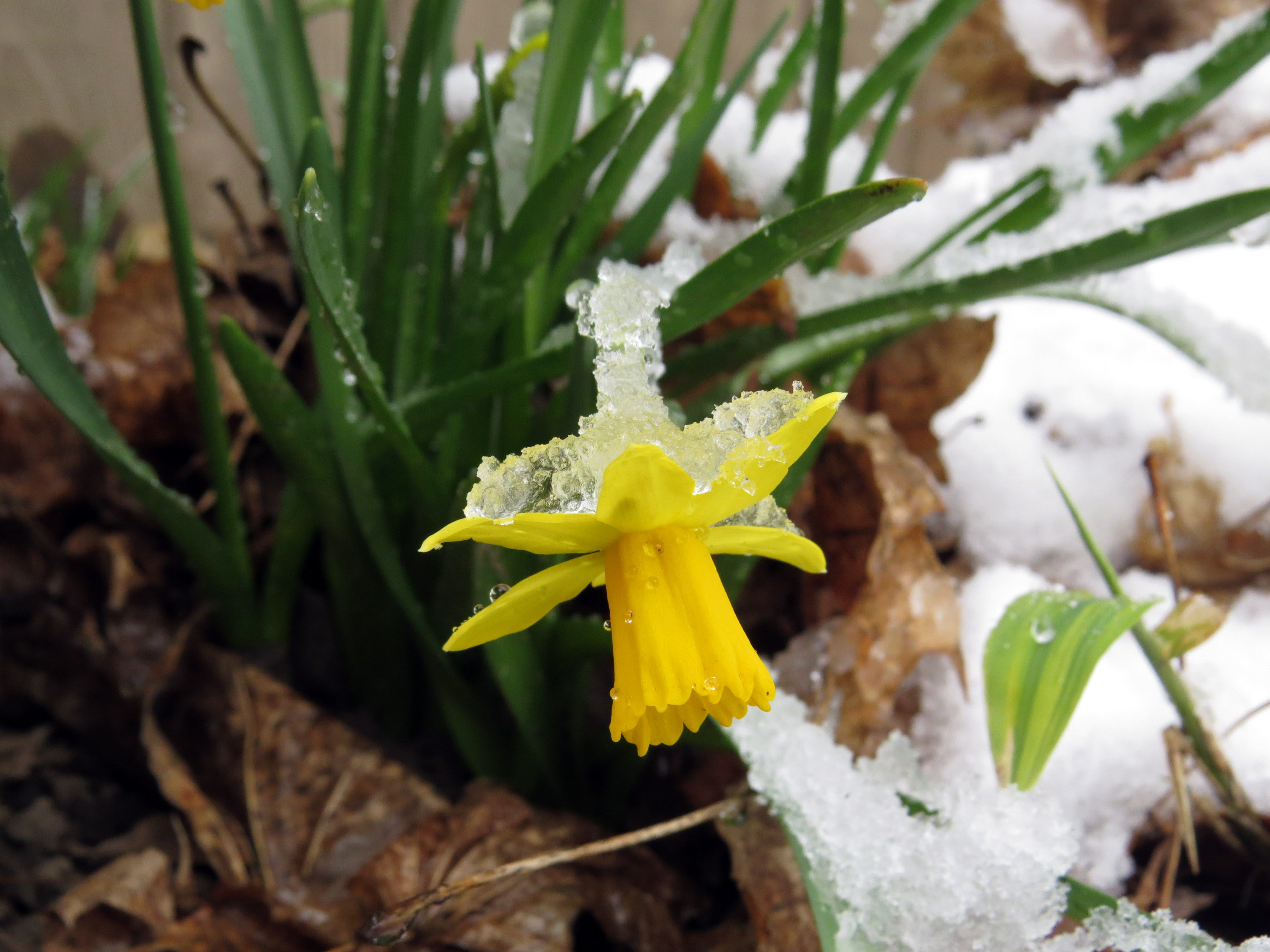
Miniature narcissus, battered but unbowed. My dad planted spring bulbs all around our childhood home in Little Neck; every spring, their resurgence seemed like a miracle for which he was personally responsible.
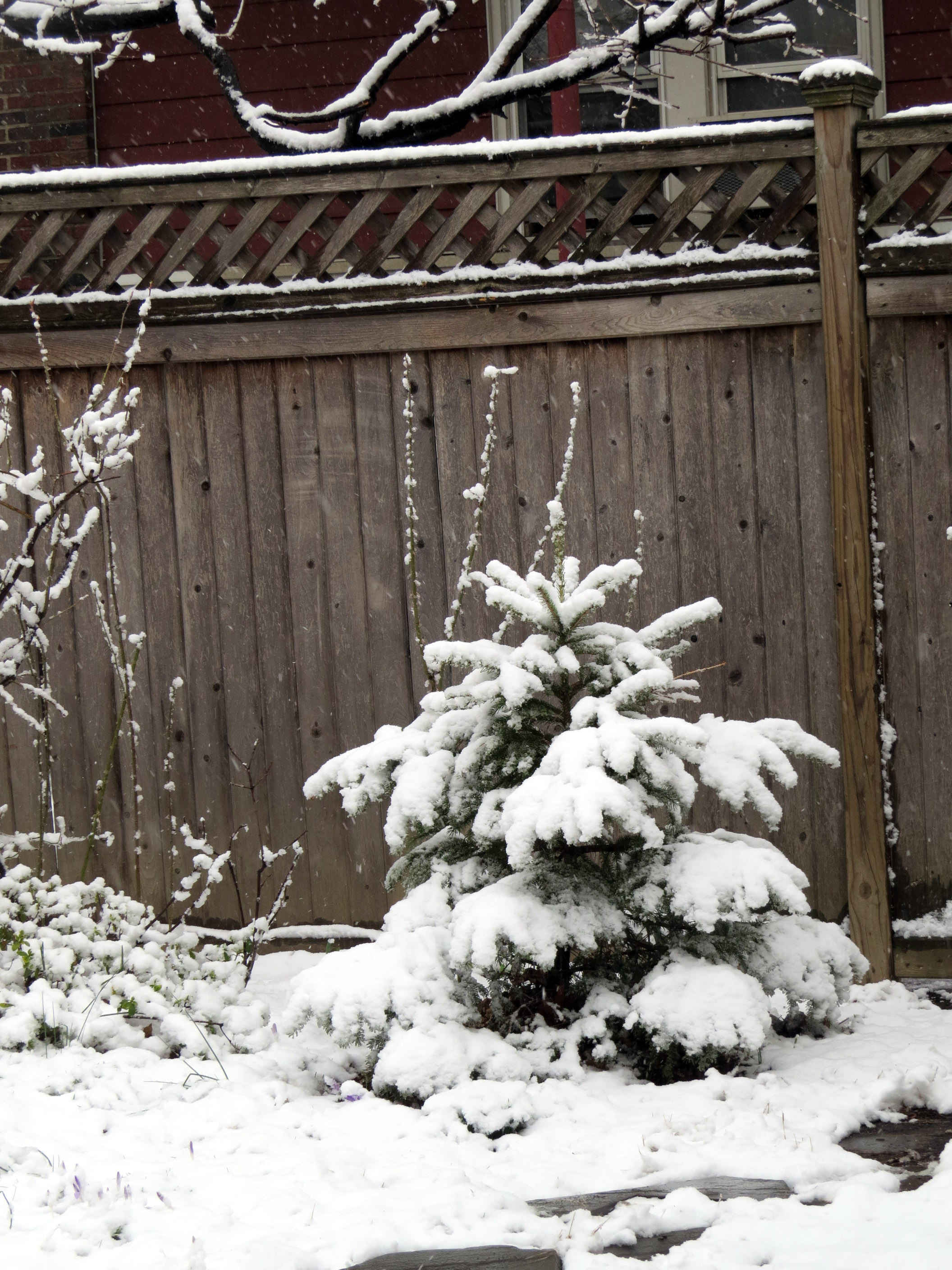 Up in the Poconos, Daddy would get out his folding army shovel and a garbage bag and dig out a mountain laurel in the woods, to nurture into bloom back in the city. Up in Maine, I rescued "Baby Groot" here as a tiny sapling from under another white spruce, and he's growing like a weed.
Up in the Poconos, Daddy would get out his folding army shovel and a garbage bag and dig out a mountain laurel in the woods, to nurture into bloom back in the city. Up in Maine, I rescued "Baby Groot" here as a tiny sapling from under another white spruce, and he's growing like a weed.
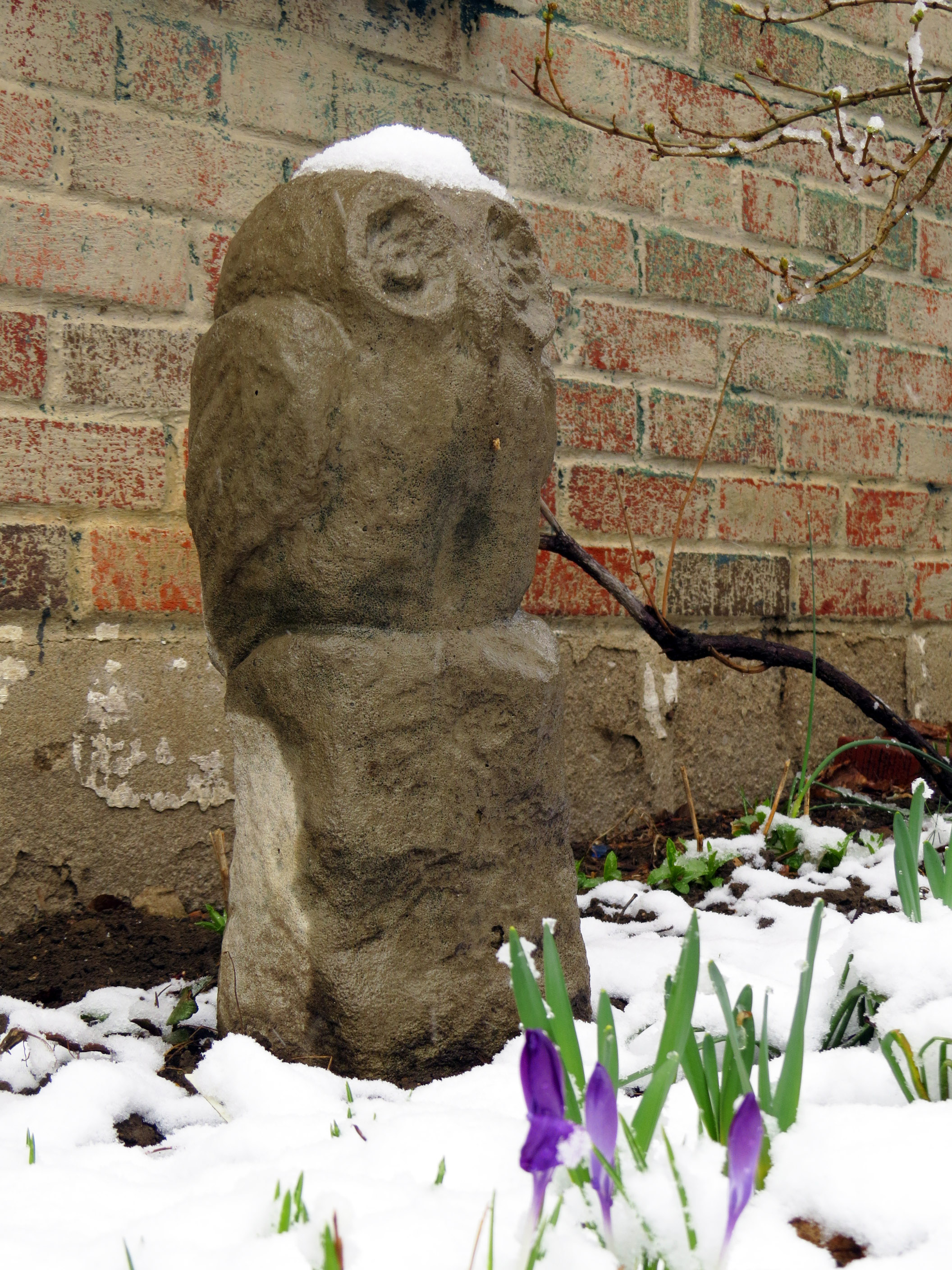
Crocus around my garden owl, which is actually a memorial mini-garden to our owlish gray cat Cocobop. Daddy was an epic rescuer, with needy stray cats and kittens drawn to him as if by magic.
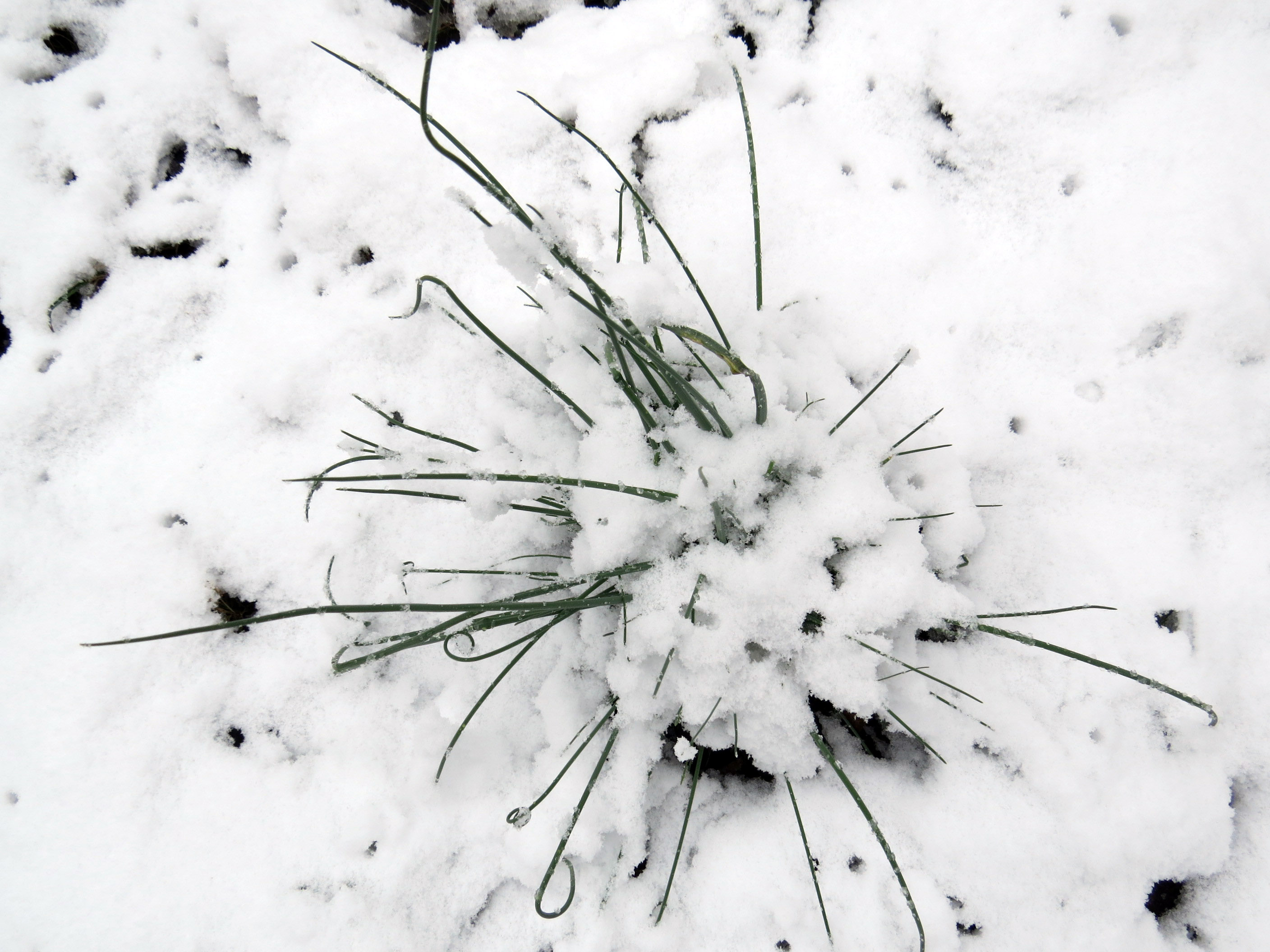
Decades before foraging became fashionable, Daddy, ever a Boy Scout, taught me which weeds in a vacant lot were edible, like butter-and-eggs, pepper grass, and (above) onion grass, and I would dutifully nibble them. This always horrified my mother, who preferred her produce from a nice clean supermarket.
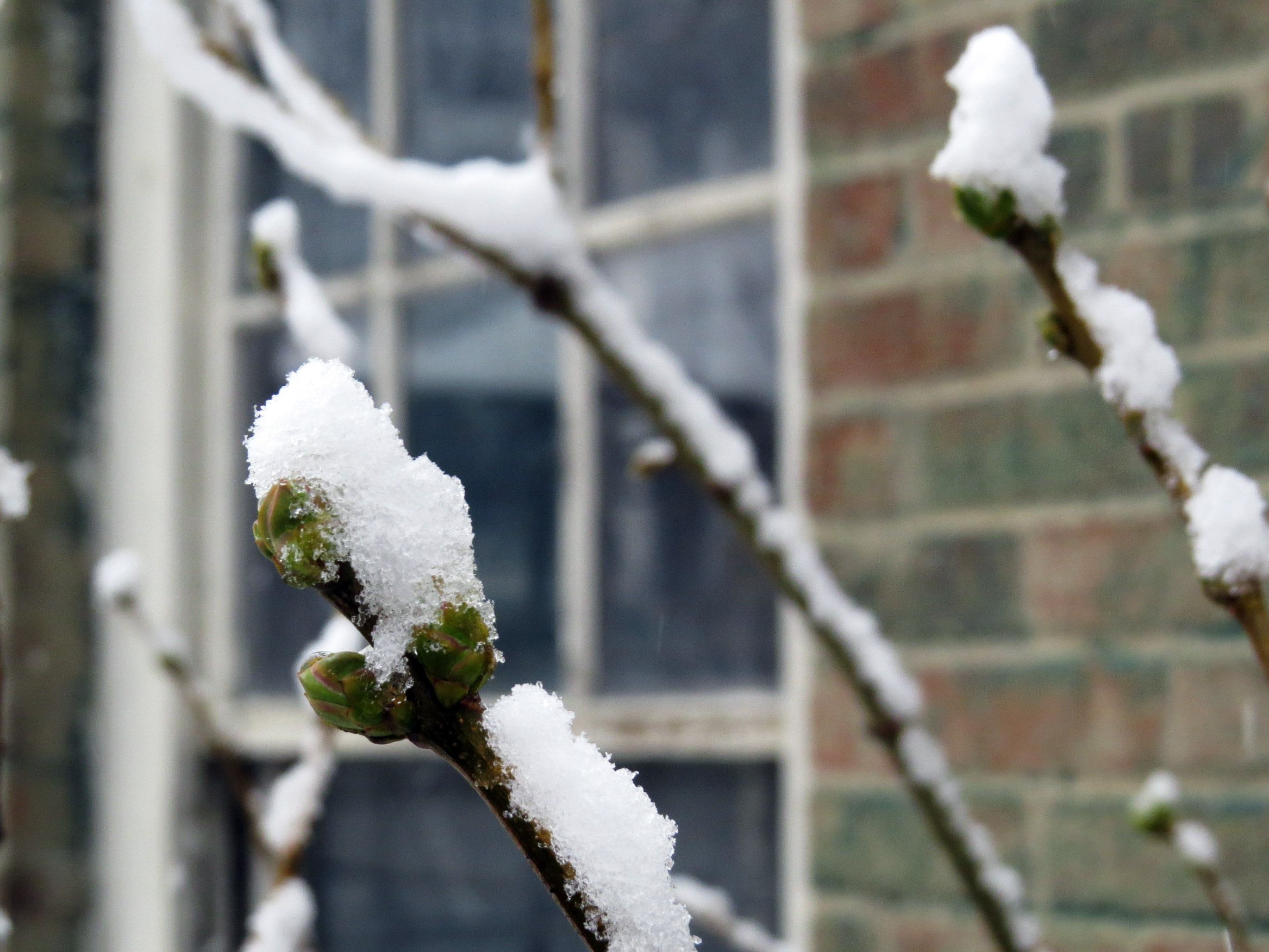
Sleeping lilac buds.
Christ has died, Christ is risen, Christ will come again. --Memorial acclamation, Roman Rite of the Mass
The Ghost Stable was real!
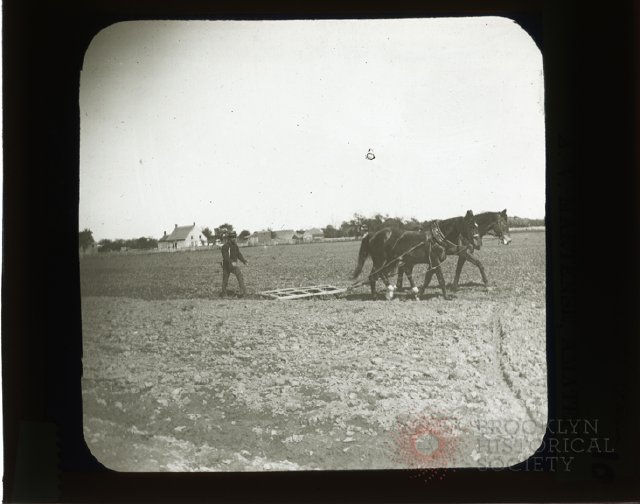 Plowing Martense Farm. Adrian Vanderveer Martense collection, Brooklyn Historical Society In every desperate New York house hunt, there is at least One That Got Away—a place that would've been perfect, "if only." If only you hadn't been outbid. If only it weren't next door to a slaughterhouse. If only...
Plowing Martense Farm. Adrian Vanderveer Martense collection, Brooklyn Historical Society In every desperate New York house hunt, there is at least One That Got Away—a place that would've been perfect, "if only." If only you hadn't been outbid. If only it weren't next door to a slaughterhouse. If only...
In our hunt for the Crazy Stable 30 years ago, we had two "Ones That Got Away." We put a binder on one, a roach-filled frame house behind Our Lady of Refuge church, but pulled out of the deal when an inspector found a deeply split joist; we were game for a good exterminator, but not for a house collapse.
Wyckoff House Museum, BrooklynThe other? For three decades, it has haunted me: The sort-of-Dutch Farmhouse somewhere in Prospect Lefferts Gardens, a neighborhood of mostly row houses east of our current one. It was a solidly Caribbean area of pristine side streets giving onto economically depressed avenues full of empty stores behind graffiti'd roll-down gates. But this was no row house: In memory, it is a tidy frame, with charming original door hardware. In the living room, the fireplace is surrounded by what appear to be original blue-and-white Delft tiles. There is a small, shaded back yard, a driveway and a garage, but the garage is a barn, with a hayloft and rusty farm tools. Was it built before any of its neighbors, when Flatbush was still farmland?
If only...if only it had not been squashed up against a big brick apartment building, whose side wall loomed tightly next door, blocking out light. If only the avenue around the corner had not been so despondent and menacing. We sought a "mother/daughter," and I couldn't picture the persnickety Irish mother faring forth along that commercial strip, whose sole bright outpost among the bodegas and hair salons was a Caribbean bakery and Catholic church a few blocks down. We let it pass, and wound up in the Crazy Stable—a house in vastly worse shape, but in a better location nearer the park.
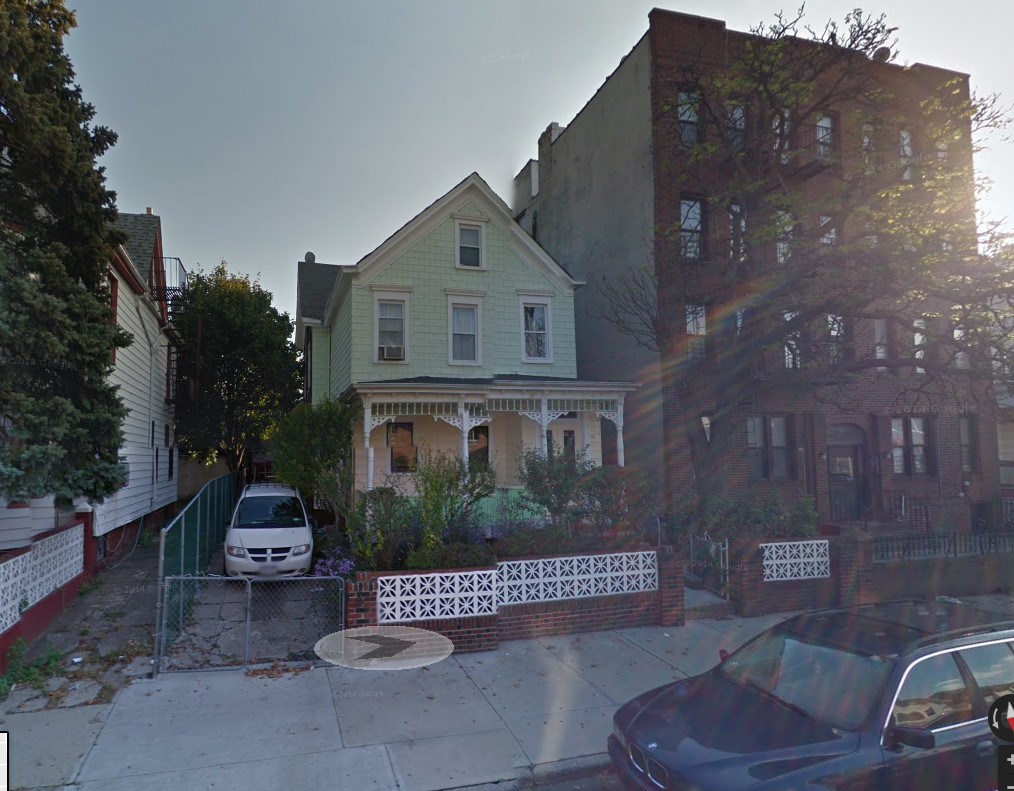 But I never forgot the Delft tiles and the rusty plough. I kept scattered records of our house-hunt and no photos (people just didn't take pictures of everything back then), and could never remember where the house was. I even looked for it a few times, and began to suspect I'd dreamed it. But just now, in some old notes, there it was: 366 Rutland Road, between Nostrand and New York Avenues. I raced to Google Maps, and it's still there—looks almost the same, faded but dear, hunkered in the shadow of the apartment house. And that stretch of Nostrand still looks pretty sad, although there's a fancy-looking bakery around the corner now; gentrification is not on fire here yet, but the sparks will catch. Are the farm tools still in the garage? When was it built? How much land did the owners till?
But I never forgot the Delft tiles and the rusty plough. I kept scattered records of our house-hunt and no photos (people just didn't take pictures of everything back then), and could never remember where the house was. I even looked for it a few times, and began to suspect I'd dreamed it. But just now, in some old notes, there it was: 366 Rutland Road, between Nostrand and New York Avenues. I raced to Google Maps, and it's still there—looks almost the same, faded but dear, hunkered in the shadow of the apartment house. And that stretch of Nostrand still looks pretty sad, although there's a fancy-looking bakery around the corner now; gentrification is not on fire here yet, but the sparks will catch. Are the farm tools still in the garage? When was it built? How much land did the owners till?
I'll probably never know. The house sits just east of the site of the old Lefferts' farmstead (from which the Lefferts Historic House was moved to nearby Prospect Park). As of 1909, it was home base for two builders named Larsen and Anderson, who designed other Flatbush homes, according to this account; real-estate sites claim it was built in 1910, but I suspect it might be much older. I'm just glad it's still there. I hope whoever bought it has had as many happy years within as we have had here. And I hope they kept the farm tools.
The chicken on the bus
According to the New York Times, Hillary Clinton is almost certain to win New York's electoral votes.

Thank God. That means I can vote for neither one. If it were close, I would feel obliged to vote for her, to keep him out. Hillary: the champion of unrestricted access to abortion at any stage of development. Not for her "safe, legal and rare," the catchphrase of her canny husband, who paid lip service to the pain and loss attendant upon killing the unborn. No, Hillary is the heroine of the #shoutyour abortion crowd, the patron saint of the corrupt butchers of Planned Parenthood. That's who I would have voted for, if the election in my state were close. That's how appallingly dangerous and vile Trump is.
And here's how that would make me feel: Do you remember the last episode of M*A*S*H*?
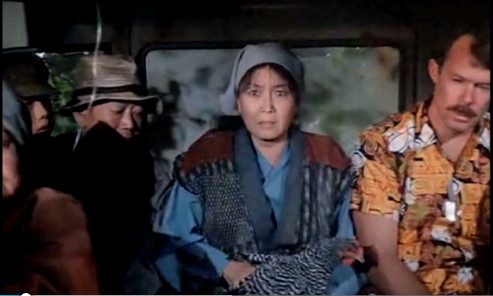
It was called "Goodbye, Farewell and Amen." In it, Hawkeye (Alan Alda) had a nervous breakdown and recounted to a psychotherapist the story of being on a bus with Vietnamese refugees, hiding from an enemy patrol. Their silence is imperative–but one poor terrified woman holds a chicken that won't stop squawking. Hawkeye furiously tells her to silence the chicken, or they will all be killed. To his horror, she does the only thing she can do–she strangles it.
Only it wasn't a chicken. The ghastly truth emerges from memory: The woman had been holding her baby. She smothered it, in desperation and fear for all their lives.
We cannot hand the nuclear codes to a madman, and our country to a loathsome demagogue–even one who claims a laughably implausible "conversion" to pro-life. But the cause of protecting the unborn has been strangled, the crying baby silenced, as the even greater and more immediate threat prowls outside the bus, locked and loaded.
And thus the odds seem good that the first woman president of the United States–a mother and a grandmother–will, in a repellent irony, enshrine as never before the "right" to silence the heartbeats of our most vulnerable brothers and sisters in the womb. Without remorse, without restriction, and–if she gets her dream–with our tax dollars to subsidize the heartbreak for the neediest women, who need real alternatives, not death for their children.
Ultra-blue-state New York, you will have done my dirty work for me. But if I lived in North Carolina or Florida, I'd do it. I'd vote for the "lesser of two evils"; I could even parlay it into a cheering welcome to the cool kids' table among my liberal friends. And I'd try to remember casting a ballot for the candidate who was just okay with killing chickens.
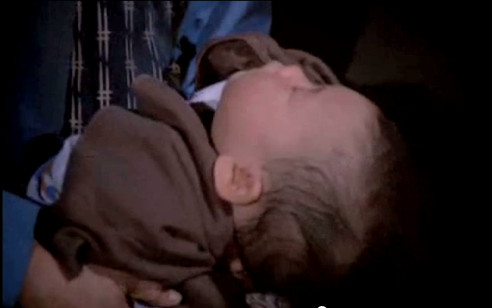
Rise like the day
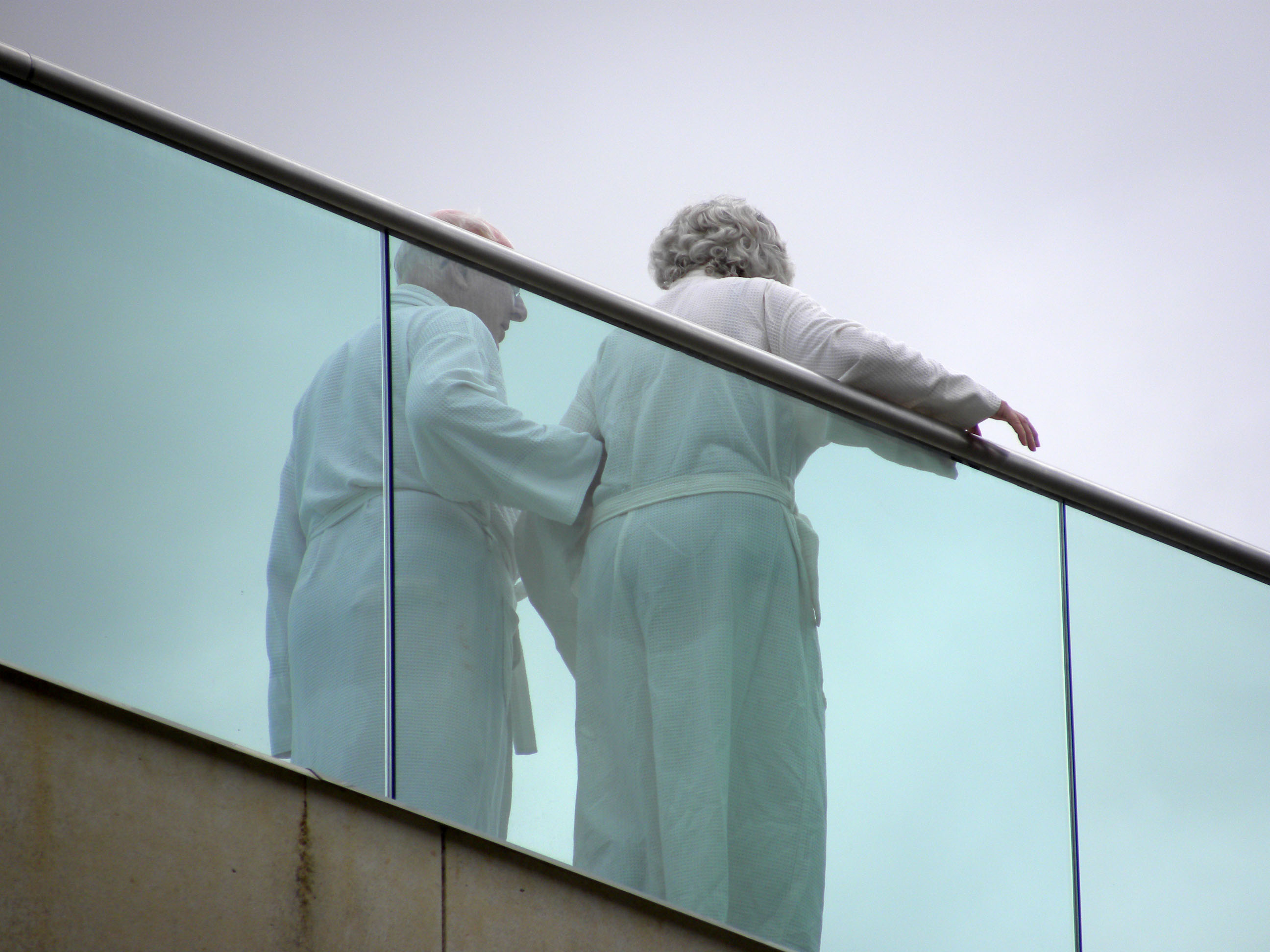 Bath, England, 2010 Photo by Brenda L. BeckerSomeone shared a music video of a magnificent singer named Andra Day, singing a beautiful song, "Rise Up." The video (below), directed by M. Night Shyamalan, unleashed a flood tide inside me, with its tender, spare depiction of a couple in love, one of whom is physically dependent utterly on the other.
Bath, England, 2010 Photo by Brenda L. BeckerSomeone shared a music video of a magnificent singer named Andra Day, singing a beautiful song, "Rise Up." The video (below), directed by M. Night Shyamalan, unleashed a flood tide inside me, with its tender, spare depiction of a couple in love, one of whom is physically dependent utterly on the other.
You're broken down and tired
Of living life on a merry-go-round
And you can't find the fighter
I've done my years as a caregiver--I know just where to reach for the brakes on a wheelchair, the safety belt in the back of an ambulance. I have "hacks" for full assisted transfers, bed shampoos, bedsore prevention. I've said a thousand versions of this, in nursing homes, ICUs, my mother's bedroom:
But I see it in you so we gonna walk it out
And move mountains
We gonna walk it out
And move mountains
But now, in a heart-aching rush, so many people I love have been called upon to move mountains.
My beloved cousin, an irrepressible paraplegic, just marked a year since he fell from his wheelchair, sustaining a fresh injury that will not heal. His beautiful wife, an effervescent woman with a core of steel, manages his overwhelming medical and logistical needs (with help from their grown daughters) while never losing sight of the man she loves--a doctor, a gentleman farmer, an advocate for the disabled. This year, when he finally returned to their Michigan home, they created a new garden he could see from his window.
And I'll rise up
I'll rise like the day
I'll rise up
I'll rise unafraid
My old friend and colleague, a creative and brilliant medical writer, is on an epic journey with his wife, a mother and artist, as they battle her breast cancer together. With her fury and courage, and his agile mind and deep clinical knowledge, they continue to navigate through a labyrinth of oncologists, tests, treatments, seeking hope, and most of all, seeking compassion.
All we need, all we need is hope
And for that we have each other
And for that we have each other
My two dear friends from church, who finally married when the law recognized their longtime love, now hold one another's hands in the coronary care unit of a Brooklyn hospital. They are adorable--a Tall Guy and a Short Guy, both theater-world veterans and devout Catholics. It was years ago, watching Tall Guy push Short Guy's wheelchair home from church, that I truly recognized the sacramentality of marriage beyond its traditional bounds--"an outward sign signifying God's grace." Now Tall Guy strokes his husband's silver hair when the pain and fear grow too much. "What do you see?" Short Guy asked him this week, terror in his eyes--the terror of vanishing, a look I know all too well. "I see the person I love," his love replied.
When the silence isn't quiet
And it feels like it's getting hard to breathe
And I know you feel like dying
But I promise we'll take the world to its feet
And move mountains
And now, my BFF, my best friend forever. Her love, too, is at her bedside night and day. Working the system. Making the nurse come faster. Adjusting the pillows and covers, the piece of the world she currently rules. Strategizing for discharge, rolling with the punches, and hoping for hope. Leaning over and seeing the person he loves, assuring her she is not, as she fears, disappearing from anything resembling the life she has known.
I'll rise up
In spite of the ache
I'll rise up
And I'll do it a thousand times again
And there we have the genius of this song. Whether the songwriters knew it or not, with this lyric they reach in and recognize the heart and soul of the caregiver journey.
The ache. In spite of the ache. A thousand times again. Where does it come from, that rising, every day? What refills the well a thousand times? It isn't just a well, if you're lucky, or blessed. It is a spring. A wellspring, for the well and the sick. It rises not from one of you but from both. Love dissolves your boundaries. You go past the place where the chattering advice absurdly says "Take time for yourself. Get a massage. Have a manicure. Relax over a special cup of coffee. Put the oxygen mask on yourself first, ha ha."
We once had a crazy old pastor--seriously, mad as a bat out of hell--who wagged a finger and told the congregation, "There are no coffee breaks on the Cross."
The caregiver journey goes past the Oprah-esque, treat-yourself-to-a-cappuccino stage at some point right to the foot of the Cross. "Me before you" or "you before me" ceases to be an issue; they are what Richard Rohr calls "false dualities." Things can actually seem lighter then, in a way. Light enough to rise.
I'll rise up
I'll rise unafraid
I'll rise up
And I'll do it a thousand times again
For you
"Rise Up" Written by Cassandra Monique Batie, Jennifer Decilveo • Copyright © BMG Rights Management US, LLC